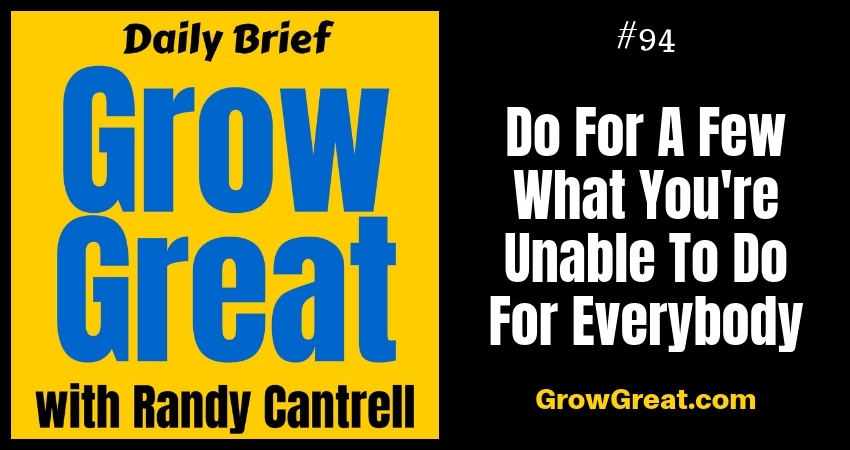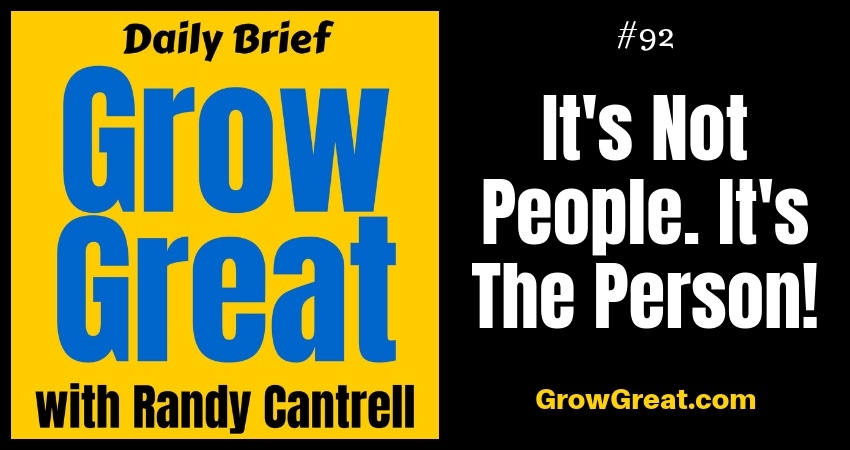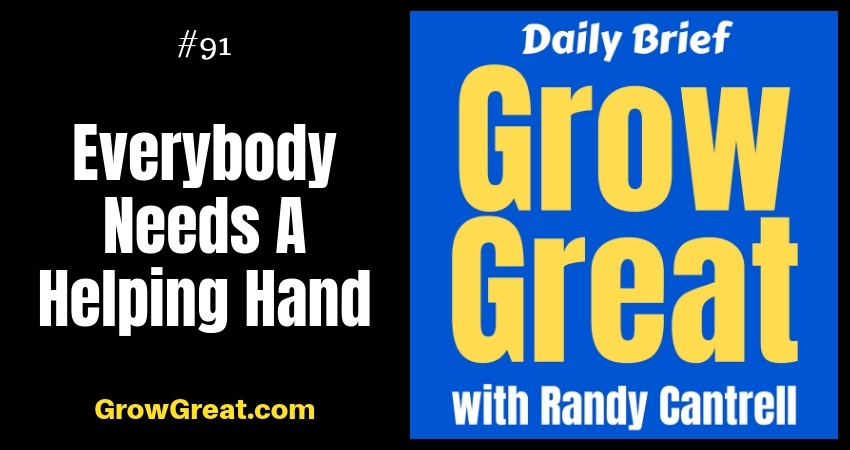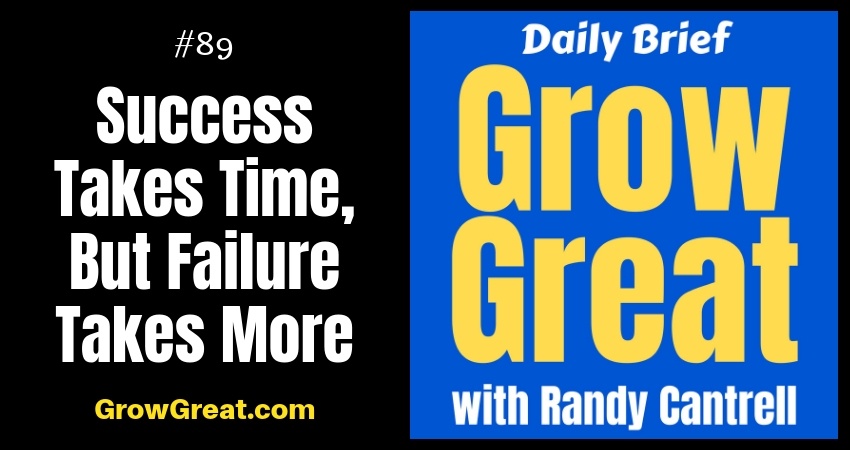Do For A Few What You’re Unable To Do For Everybody – Grow Great Daily Brief #94 – October 31, 2018
Podcast: Play in new window | Download (Duration: 9:10 — 8.9MB)
Subscribe: Apple Podcasts | Spotify | RSS | More

Funny how some things you learn when you’re young in business stick with you. This is one of those lessons I learned when I was still a teenager selling stereo gear. Sometimes you can really dazzle somebody by doing something extraordinary. Do it.
There’s no hard fast rule for knowing when to do this, but it’s powerful for many reasons. It creates a customer who is excited and happy. It fosters good news being spread about you and your business. It demonstrates how important customers truly are to your employees. It shows your heart of leadership and service.
The lady purchased a pair of stereo speakers. They were fairly large, floor-standing speakers. The company I worked for manufactured them in their own shop. The cabinets were thick wood with an oak finish veneer. She had them for less than 2 days. Somebody, presumably the man in her life (she was probably in her 20’s so she seemed old to me since I was still in high school) unboxed the speakers to help her place them in her living room. Well, the doofus evidently didn’t know to open the bottom of the box, flip it upside down onto the floor, then slide the box off the speaker. Instead, he attempted to slide the speaker out of the box while holding it and as you might imagine…it didn’t go well. For the speaker. Or him. The speaker landed on a corner and it boogered up the corner. She was sick about it. So she called. I told her to bring it in and let me look at it to see what we could do. (This was before digital photography so we didn’t’ ask customers to take a photograph, then take that film to the drug store to be processed, then hand deliver the hard photo.)
I was expecting it to be awful. Like the corner flattened completely. It was badly scratched and the finish was damaged. I asked the manager if somebody in our shop might be able to repair it. He was pretty confident they could. We stood there talking about it and I decided to plead her case. She had purchased a complete system and spent considerable money. Anticipating my request (I guess), he said, “Just take them back and give her a new pair. Make sure you show her how to unbox them.”
Thankfully, I had asked her to bring in both speakers (they were in separate boxes). That day I was able to do for her what I knew I’d be unable to do for everybody. She was beyond thrilled. In fact, I’d guess she was more excited about that than when she first got the system, just 48 hours earlier. She was sure to tell everybody how terrific I was, and how awesome our store was. She was even thrilled seeing how to unbox them (another lesson I learned; don’t assume customers know what you know…show them).
I’ve got tons of stories from my years running retail companies. So many times I’ve done extraordinary things for customers. Things I’d never be able to do for everybody, but I quickly learned you just do it when you know it’s the right thing to do. It’s a feel kinda of a thing. You know it when you feel it. Or see it.
People are people. Yes, employees are people, too.
I’ve hired a number of people in my life who were down and out in some way. People who struck me as good people, potentially good employees, but people who seem to need a break for some reason. Sometimes I’ve hired a person then taken them shopping and purchased them appropriate working attire. Sometimes I’ve advanced them pay so they could rent a place to live. Or make a down payment on a car. Above and beyond actions for an individual — something done for them that I clearly wasn’t going to do for everybody. Right is right.
Enter judgment. Enter fear.
I’ve heard it all through the years. People have challenged me saying, “You’re just opening yourself up to have everybody expect that.” Or, “You can’t single out an employee or you’ll have big trouble from the other employees.”
I’ve behaved this way for decades! I’ve never, ever encountered a single problem. And if I had, I would have had no problems. Others may have had a problem, but I wouldn’t have taken ownership of it myself. Doing something good – something extraordinary – for a few doesn’t mean everybody gets a trophy. Besides, I grew up in a Christian home and even as a teen I already knew a truth.
Proverbs 3:27 “Withhold not good from them to whom it is due, When it is in the power of thy hand to do it.”
Okay, maybe it wasn’t always “due,” but it was needed. And as a leader (even as a teenage salesperson), I had the power to do it, or to influence it. So I did.
Today is the last day of the month. I’m encouraging you to end the month on a high note. And to jump start November, too. It’s right and it makes more sense than ever before.
I grew up in retail back in the days before the Internet, or cell phones, or fax machines. If one customer with a complaint could tell 9 people (I remember that stat being put forth as fact) back then, think of how many hundreds of people can be told today. And if one customer with an extraordinary experience could tell a few people back then, they can post it all over social media today and get the word to potentially thousands. Not to mention Google and Yelp reviews, and all the other places where people can extol how terrific we are at taking care of customers. The same goes for employees. Glassdoor and other employee review sites – plus social media – can also spread the word.
Stories spread the news. People talk. They share.
But…
That’s not why we do it. That’s just a big collateral advantage to doing the right thing. We do the right thing because it’s the right thing to do.
Is your heart and mind open to going the extra mile when you can? That’s another Biblical principle based on Matthew 5:41 “And whosoever shall compel thee to go one mile, go with him two.” Some call it second-mile religion. Well, I’m here to tell you that second-mile religion inside your company works! At every level.
Being nice is its own reward. Doing the right thing is, too. And we all know that what goes ’round comes around. So today, and tomorrow, do for a few what you can’t do for everybody. Don’t be afraid.
Be well, Do good. Grow great!


How Can You Help The Podcast?
- Subscribe at iTunes | Stitcher
- Leave us a review at iTunes
- Pick your favorite way to support us financially
- Join the conversation at our Facebook group
- Tell your friends. Promote the shows on social media.






